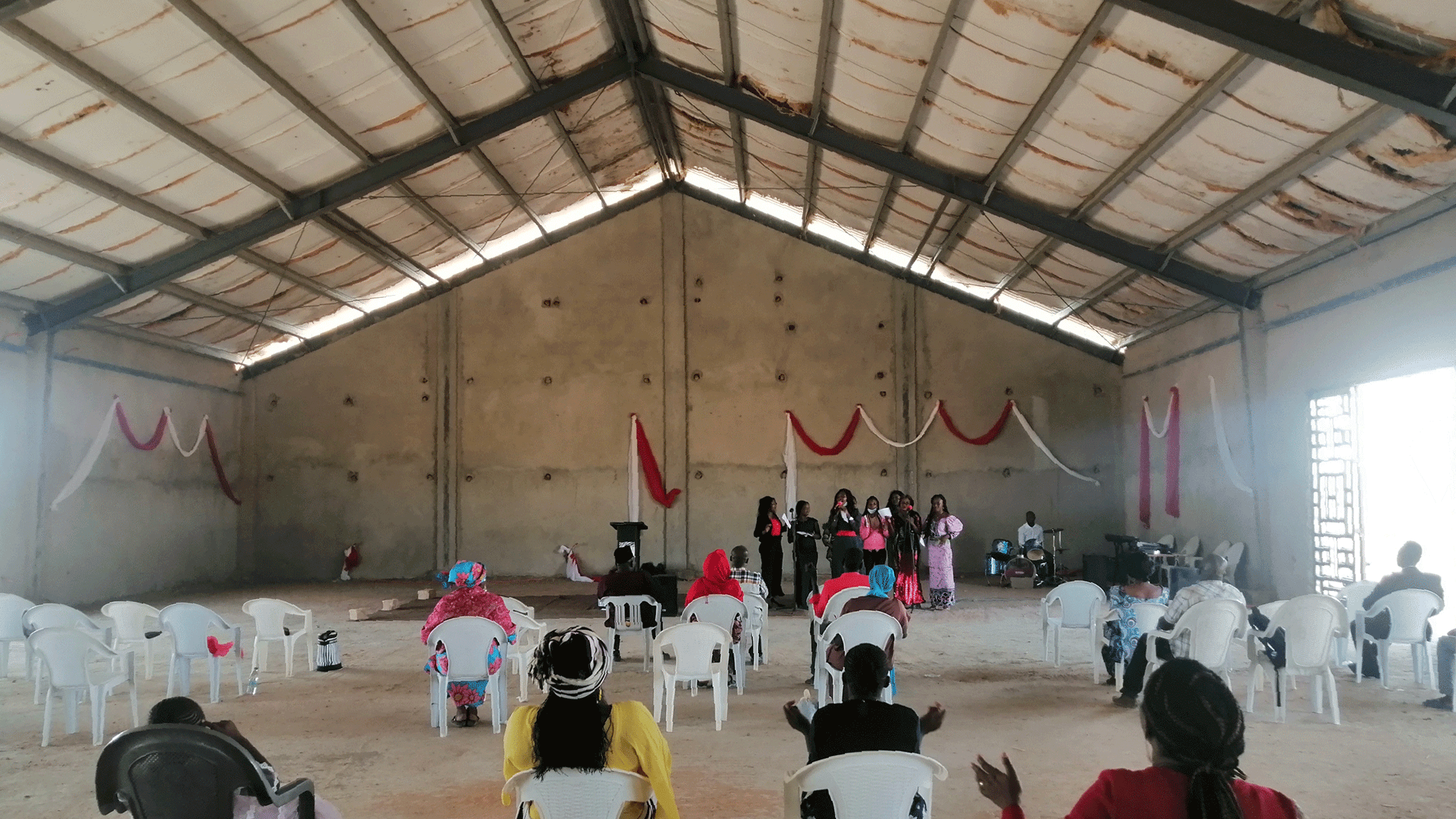The uniquely West African season of harmattan, when the northeast trade winds spew dust from the Sahara Desert into the Gulf of Guinea, has been the backdrop of all my Christmases. This year I traveled from Kigali, Rwanda to Niamey in Niger Republic—the northern neighbor to my home country, Nigeria—for my first Christmas away from home.
It was scorching when I arrived a few days before Christmas, an average of 30 degrees Celsius (86F); I spent a few sheltered days, mostly wrapped up with a cocktail by the terrace at the Radisson Blu hotel in the most picturesque part of the capital city. The day before Christmas I awoke to find a familiar dry, caressing wind flinging carrot- and sandstone-coloured sand into my eyes and nostrils: harmattan, almost as I had known it in Nigeria, except this time it wasn’t as cold; its breeze was mild and gentle, the desert heat unflinching. It would last for the next few days, disappearing completely before the end of this difficult year. On Christmas day, though, I stepped out of the luxury bubble of the hotel to experience a very dusty and nostalgic visit to church.
I had spent the previous evening clinking glasses with a number of new acquaintances, cheering to Christmas, and then dancing; reluctantly at first, then delightfully, once I’d gotten songs by Joeboy and Fireboy DML played at my request. Dance, wine and new company this year took the place of the deafening yet exhilarating fireworks from nearby streets and far-flung yards I’ve been used to at Christmas; the live chickens awaiting slaughter, choosing the ideal outfit for Christmas service, joining the throngs of opulently dressed everybodies swimming in and out of church, festive in both attire and mannerism. As dawn approached, Amanda, a new friend, Burkinabe, raised in Niger, invited me to come to church with her. I accepted eagerly, out of respect for the Christmas tradition that was part and parcel of my upbringing, and also out of curiosity to experience a churchy Christmas in a predominantly Islamic country.
Waking from barely three hours of sleep and without time for a shower, I threw on an overstretched blue jean and squeezed into a tight black camisole, a base for my extra large transparent pink, white-dotted chiffon top, a hand-me-down from my mother. Days prior, packing in Kigali, I’d decided on a pastel Ankara-print minidress for Christmas day in Niger, and my last surviving dress for the New Year. But advice from Amanda, and the obvious full-body-garment dress code one can observe from the shortest walk in the city, convinced me I needed to adjust my choices, opting for convenient, airy modesty.
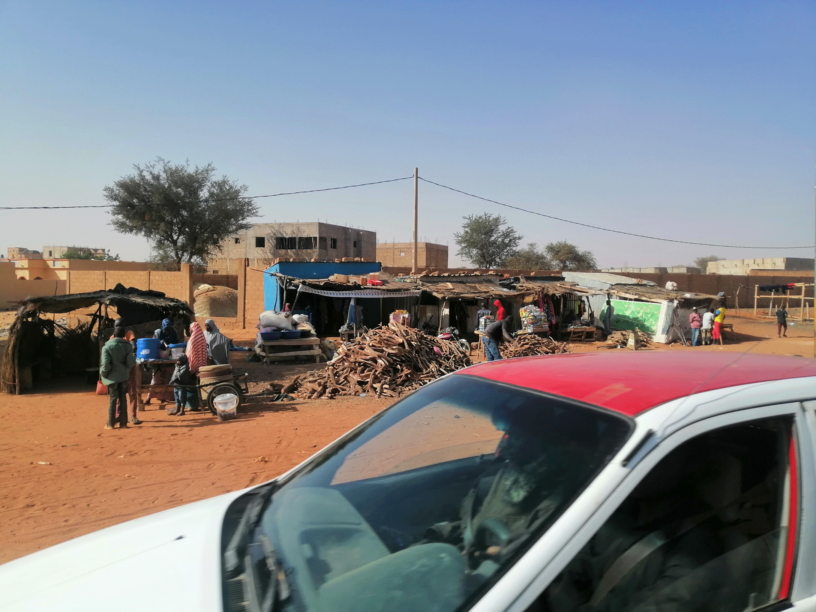
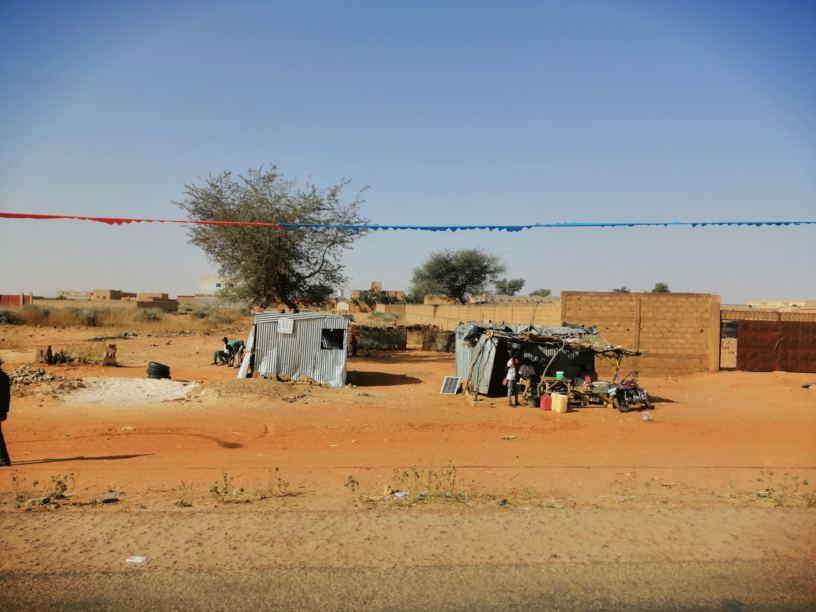
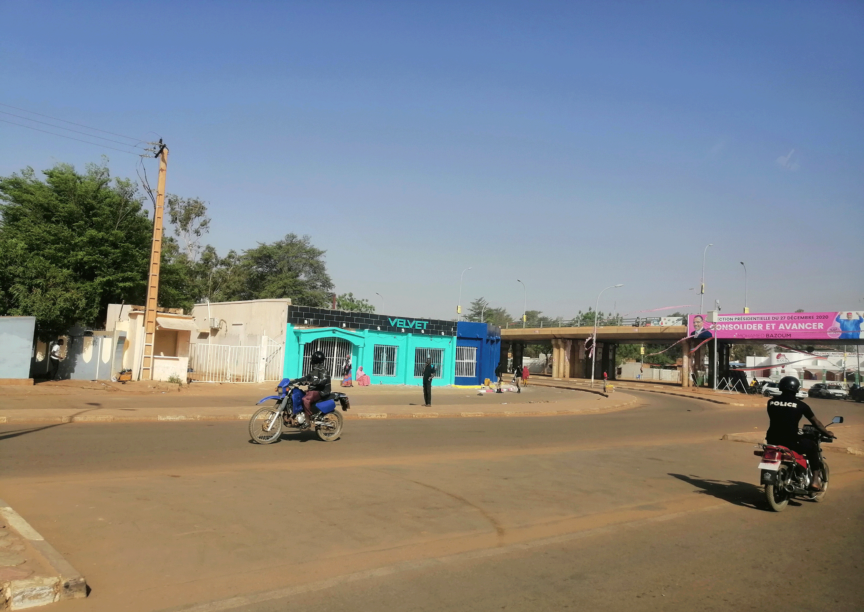
Our journey to the Mission Internationale Jésus qui Guérit was two-phased. First, we had to get to Académie des Arts Martiaux, which had been the church’s former rental location. Thereafter, we boarded a van provided by the church to an unfinished bungalow, the permanent church site in Koirategui.
In the multi-sports court at the Académie des Arts Martiaux, while we waited for what felt like a millennium for the van, I took stretch walks around the perimeter of the court, all fallen ceilings and scabby walls, while taking in the French-gospel choruses wafting out from a different church nearby—an appetizer, mildly preparing me for the church service to come. During the wait I was introduced to the pastor, a suited young man with a chevron moustache, and I had a brief chatter with a church member who had spent a year in Onitsha, Nigeria, and who bore hopes of living in Nigeria and running a business. I wished him well in as much French as I could muster before the van arrived at last, to collective relief. The journey to Koirategui was creaky, through tarred and dirt roads in earthy tinges, past hay-carrying camels, small shops, shacks, pick-up trucks carrying a group of Tuareg men—a panorama coated in earth, raw red earth…the tint of powder foundation. It was my first trip beyond the bubble of expatriates and the burgeoning hospitality market in Niamey.
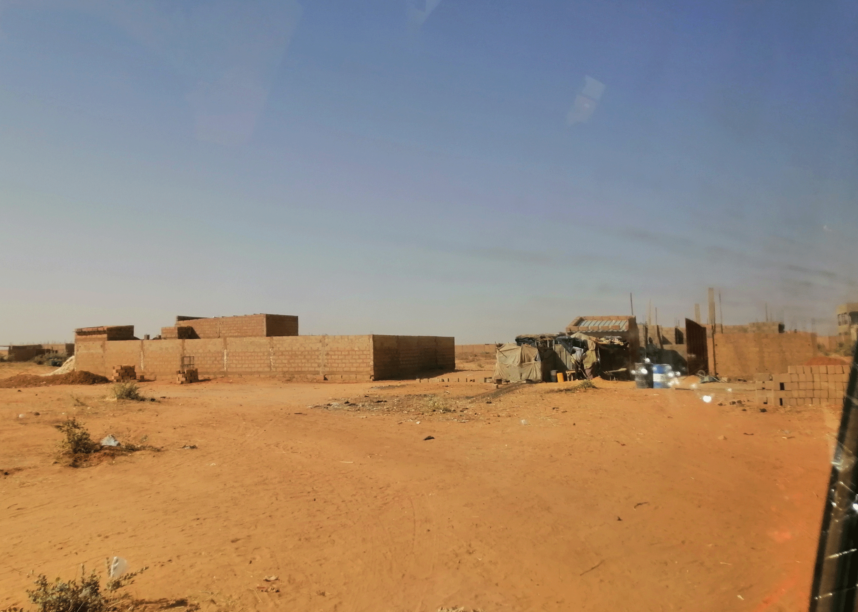
The Mission Internationale Jésus qui Guérit (“The International Mission of Jesus who heals”) had moved to its permanent site in Koirategui about two months before Christmas. The new building, an unfinished concrete hall with steel beams, was bare except for the decorative red-and-white ribbons draped in U-shaped arcs across the front of the altar, a pulpit, plastic chairs, and a few tables at the rear. The church glinted with potential. At first sight, I felt its striking resemblance to the Queen of the Most Holy Rosary Catholic church, my home church in Aba, Nigeria, whose move from a warehouse to a significantly completed permanent site marked the time margins of my formative years. I felt I could see far ahead to the slow and steady development awaiting the church, and wanted to pick up the microphone and tell the congregation that I could see into their future.
Fighting off sweeping thoughts of home, I focused on opening prayer led by a plump man in a long-sleeved linen check shirt and pointy shoes. He had the familiar gusto of prayer warriors. He strode across the brown carpet close to the altar, flanked by a set of drums, speaking in tongues—indecipherable chants ringed and hemmed in with “au nom de Jésus” (“in Jesus’ name.”) I wasn’t able to grasp much through the swooshy microphone, aside from a few lines out of his breakout songs, with lyrics simple enough for my imperfect comprehension of French. From the corners of the hall, through iron-barred doors, harmattan swept sand particles up to lovely clothes and eyes and ears and unguarded nostrils. I was glad of my mask, as dust and debris swept in throughout the three-hour service.
Opening prayer was followed by a praise session, and then an offering; after that there were Christmas carols from the choir, and an ebullient sermon. It was pleasantly surprising to hear the familiar French songs that I’d so often heard sung during secondary school assembly in Aba. Upon hearing the upbeat chorus “Jésus est mon ami. Ami de tous le jours” (“Jesus is my friend, everyday”), I lost all composure, gyrating to the gripping melody, the six years that have passed since secondary school dissolving into thin air, leaving only nostalgia. We used to sing the chorus as “ami leju leju” back then (a teenage fabrication, like the unforgivable “movez baqué” for “move back.”)
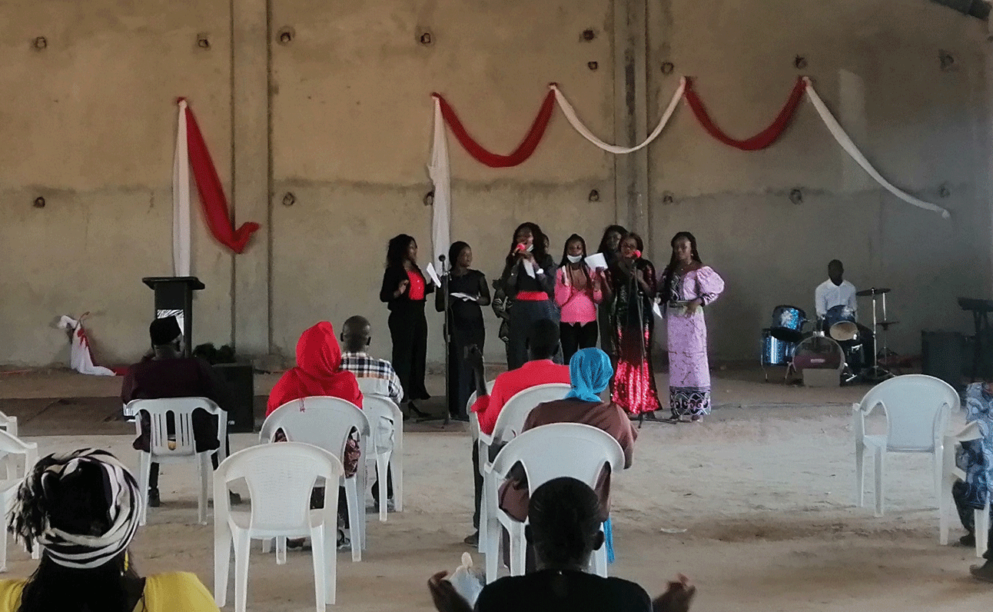
Nine colorfully dressed choristers led by a tall, dotted-silk-robed lead chorist—a Ghanaian, as I’d come to know—brought a Christmasy timbre to the service. They sang “Gloria” and “Feliz navidad” with patchy harmonies and exuberant melodies to the small but attentive congregation.
The sermon was in French, delivered by an older pastor, with translations in English from the pastor with the chevron moustache. Centered around the mysteries of God, it wove through the story of Joseph as he questioned his betrothal to Mary over her divine pregnancy; later, upon the Holy Spirit’s intervention, he saw the hand of God in the supernatural conception of Christ. I blanked out through most of the sermon, as usual for me during a long Christmas service. After the sermon, the congregation dispersed to form small groups, catching up, grabbing bissap and sandwiches from the tables laid at the back of the church. I was introduced to Lydia, a Gabonese who would later invite me for a satisfying glass of cold water at her house before dropping Amanda and me off. While Lydia completed her greeting rounds, I joined a nearby circle of choristers who were having a mini-rehearsal. I quickly learned their lines:
Quand je vois ce que Dieu a fait J’ai la paix. La joie dans mon coeur Quand je vois ce que Dieu a fait Je t’adore. Je veux te louer When I see what God has made I have peace. Joy in my heart When I see what God has made I adore you. I want to praise you
It helped that the songs had simple lyrics. There were a few off-key notes, some forgotten lyrics, shaky harmonies and misharmonies, lots of laughter, and a cheerful welcome song sung in English, French and Hausa, reminding me again very poignantly of school. We hit the climax of our rehearsal—melodies, in tune; harmonies, on point—when we got to the chorus of a song with a tongue-twisting verse that only one of the choristers, besides the lead, had been able to memorize, paired with jivy beats from the drums.
Roi des rois, nous te bénissons Nous t’adorons Qui est semblable à toi? King of Kings, we bless you We adore you Who is like you?
Before our small circle dispersed, last-minute plans were agreed on for the New Year service. The uniform was to be white shirt with blue jeans. Barely had an agreement been reached on the uniform when the conversation shifted from the musical to the puritanical, drawing open the curtains on the sort of Christianity I knew well from the churches I’ve attended in Nigeria. The choir leader broke into a loud prayer for 2021 to be a year of marriages and diplomas, and marriages. “Elle va marier. Elle va marier. Elle va marier,” she went. “There will be a lot of marriages in the choir,” she stressed, to buoyant amens from the circle. Going ahead, she described in detail, also in prayer, the specific nature of these marriages – grooms who would go through the pastors and the church; “serious grooms,” she stressed, though without failing to ascribe a dose of the responsibility to the choristers: “…but God is only going to bless those who are ready.”
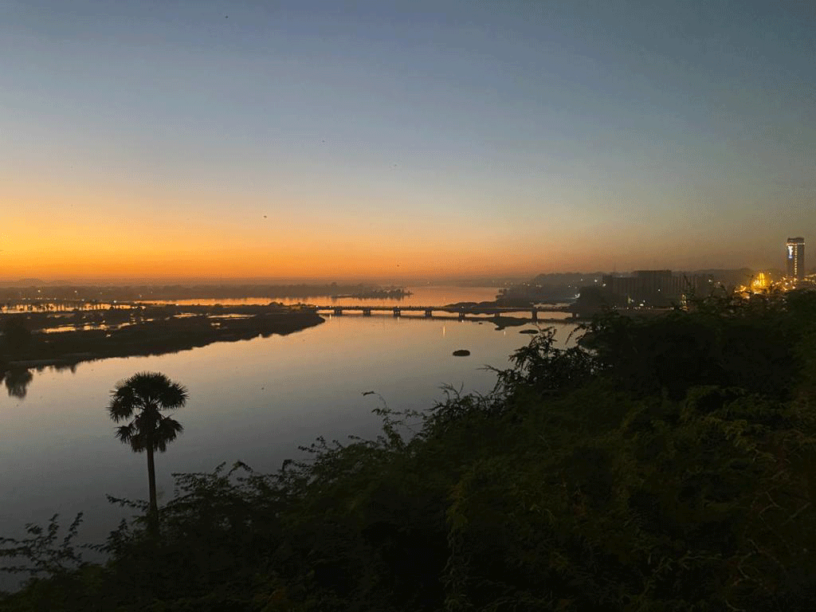
I left church full and grateful for the chance to have experienced Christmas service in Niamey, a celebration in a new land and climate, yet filled with the same familiar winds and melodies and traditions of home.

